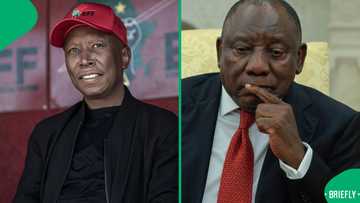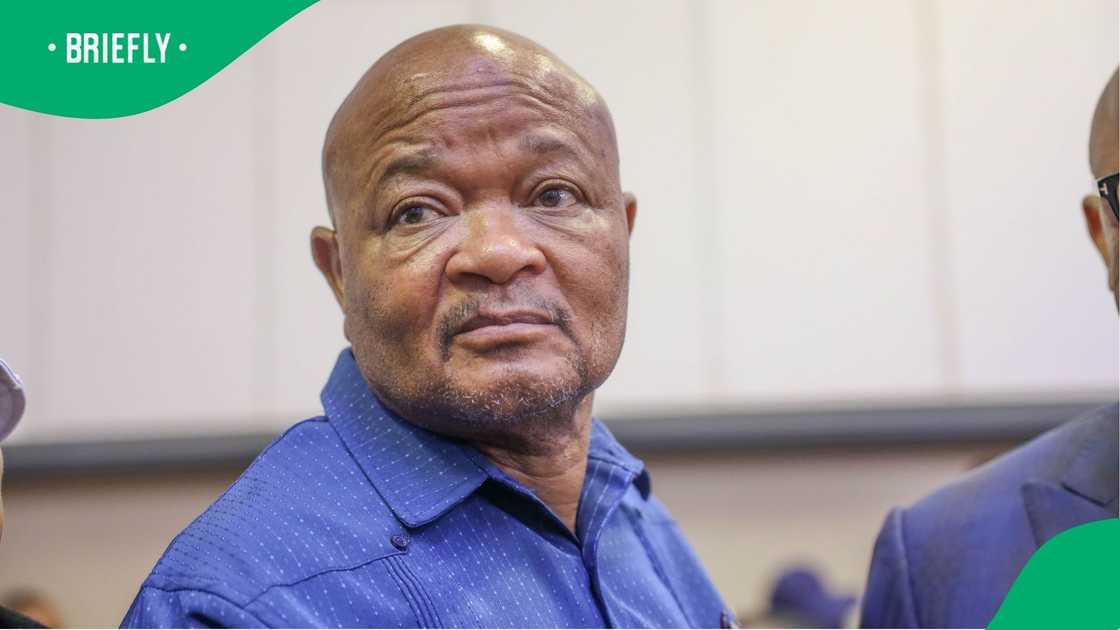Cyril Ramaphosa Says It Would Be Unfair to Fire Senzo Mchunu Based on Allegations Alone, SA Annoyed
- President Cyril Ramaphosa explained why he didn't fire the Minister of Police Senzo Mchunu
- The president also defended his decision to establish a Commission of Inquiry to investigate the allegations
- South Africans weighed in on the president's explanation, speculating why he really shielded Mchunu

Source: Getty Images
Briefly News journalist Byron Pillay has dedicated a decade to reporting on the South African political landscape, crime, and social issues. He spent 10 years working for the Northern Natal Courier before transitioning to online journalism.
WESTERN CAPE - President Cyril Ramaphosa has defended his decision to place Senzo Mchunu on leave and establish a Commission of Inquiry following allegations made by Lieutenant General Nhlanhla Mkhwanazi.
The president announced both decisions on 13 July 2025 during a national address, but his announcement was met with criticism by many. Ramaphosa earned criticism for commission, which many stated doesn’t produce results, as well as his decision not to remove Mchunu from his post.

Read also
"Why should we subject criminals to commissions": Malema slams Ramaphosa for protecting Mchunu
But Ramaphosa has since defended the decision, saying that he could not take measures against Mchunu based on untested allegations.
PAY ATTENTION: stay informed and follow us on Google News!
What did Ramaphosa say?
Speaking in the National Assembly on Wednesday, 16 July 2025, Ramaphosa defended the commission, saying that it was that they did not result in tangible actions. He also said that the inquiry was needed to investigate the claims made by Lieutenant General Mkhwanazi.
He also responded to the calls for Mchunu to be fired solely based on the KwaZulu-Natal Police Commissioner’s allegations and for misleading Parliament.
"Not only would this be unfair, but it would create a dangerous precedent," he said.

Source: Getty Images
What you need to know about Mchunu
- Mchunu responded to Mkhwanazi's allegations, accusing KZN’s top cop of trying to attack his integrity.
- The Minister of Police admitted that he knew Brown Mgotsi, despite initially telling Parliament that he didn’t know him.
- The Democratic Alliance opened a criminal case against Mchunu following Mkhwanazi’s allegations.
- The Public Protector launched a formal investigation against Mchunu following mounting pressure to act.
- Mchunu asked to be placed on special leave ahead of Ramaphosa’s address to the nation.

Read also
Shadrack Sibiya welcomes Commission of Inquiry to prove his innocence, Mzansi thinks he's afraid
How did South Africans respond?
Social media users weighed in on Ramaphosa’s comments, with many saying that he didn’t act because he was afraid.
Bongekile Masondo said:
“Mchunu wasn’t going to go down alone. That’s the reason he was not suspended.”
Tereza van Vuuren stated:
“Because Rama is also involved, that is why.”
Martha Grunewald added:
“But the General has proof.”
Steven Gooding explained:
“He can't fire Mchunu. Mchunu has the Phala Phala file in his possession. Thieves of a feather stick together.”
Mthokozisi Thulas Nzimande said:
“How many MPs were implicated in state capture, yet they are still in Parliament. This man is confused.”
John Colvin noted:
“But Phala Phala was confirmed, and you are still sitting there.”
The nature of commissions of inquiry
Commissions of inquiry are different from court cases. While courts are adversarial, meaning two sides argue their case in front of a judge, commissions are investigative. The commission takes an active role in asking questions, collecting evidence, and trying to uncover the truth.

Read also
Gwede Mantashe appointed acting Police Minister, SA amused by President Cyril Ramaphosa's decision
The findings of a commission do not carry the same legal weight as a court judgment. They are not binding and can only be challenged through administrative review if they directly affect someone, under the Promotion of Administrative Justice Act.
One advantage of commissions is that they are allowed to consider any information they believe is useful, even if that information would not be accepted as evidence in a court. This flexibility makes commissions useful for uncovering facts and understanding complex situations.
Because the findings are not legally enforceable, it depends on the political will of the person who set up the commission, such as the president, to take action based on the recommendations. Without that action, the findings may not lead to real change.
Mchunu welcomed Ramaphosa's decision to place him on leave
Briefly News reported that Mchunu responded to President Ramaphosa's decision to grant him a leave of absence.

Read also
Floyd Shivambu’s movement demands Senzo Mchunu's removal, SA mocks former MK Party Secretary General
The Police Minister will be on leave while a Commission of Inquiry investigates the allegations of corruption.
South Africans weighed in on Mchunu's statement, sharing their thoughts on Ramaphosa's latest decision.
PAY ATTENTION: Follow Briefly News on Twitter and never miss the hottest topics! Find us at @brieflyza!
Source: Briefly News

